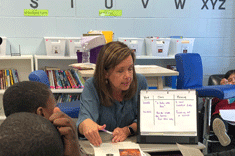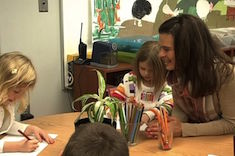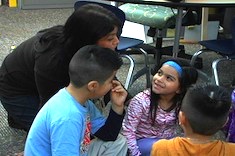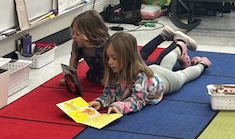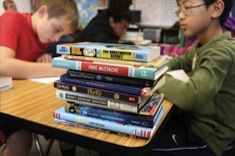Library
Choice Literacy Articles & Videos
The Choice Literacy library contains over 3,000 articles and 900 videos from 150+ contributors. Classic Classroom and Literacy Leadership subscribers have access to the entire library. Content is updated continuously, with five to six new features published each week.
Latest Content
Know/Wonder Chart
Dana Murphy shares the power of a Know/Wonder chart to peek inside the minds of intermediate readers and provide direction beyond assessment data.
April 26, 2024: Vocabulary
This week’s newsletter is about building vocabulary.
Building Vocabulary One Purple Word at a Time
Leigh Anne Eck shares one way to uplift word choice of middle school writers. Through a simple and responsive system, her students are growing their vocabulary, learning parts of speech, and taking risks with more sophisticated word choice. All you need is a purple highlighter and a willingness to celebrate student voices.
Let’s Do It Again, Together
Heather Fisher revisits a whole-school vocabulary routine that she set in motion. In this update, she shares the ways she adjusted to work together as a team rather than fly solo. This might be just the school-wide vocabulary routine you’ve been craving.
April 19, 2024: Informational Writing
This week’s newsletter is about informational writing.
Building Bridges (and Confidence): Planning Solid Essays
Melissa Quimby offers time and intentional planning to build students’ confidence and capacity as essay writers.
Informational Poetry
Hannah Tills and Josie Stewart teach students to write informational poetry. They remind us that poetry can serve as a mentor text in many units and does not have to be siloed in its own unit.
March 22, 2024: Content Literacy
This week’s newsletter is about content literacy.
Writing About Reading
Mandy Robek is on a quest to make writing about reading feel natural with her elementary students. She shares practical ways to help students change the way they approach writing about reading to lift the level of comprehension and conversation.
Morning Message 5 — Meaning and Content Connections
In this installment of the morning message series, Ruth Metcalfe unlocks a wide range of opportunities to support learning in any content area.
March 15, 2024: Differentiation
This week’s newsletter is about differentiation.
Morning Message 4: Application and Differentiation
The possibilities for differentiation during morning message are almost endless. Ruth Metcalfe highlights ways to meet a wide variety of needs via the morning message.
March 8, 2024: Word Study
This week’s newsletter is about word study.
Morning Message 3: Word Study and Conventions
There is much debate in today’s educational landscape around what and how to teach young readers about print. No matter what your classroom realities are around teaching how sounds, words, and language work, Ruth Metcalfe attests that using a morning message is an engaging way to support word study and conventions.
March 1, 2024: Thinking Ahead to National Poetry Month
This week’s newsletter is about thinking ahead to National Poetry Month.
Morning Message 2: Routine and Community
Ruth Metcalfe reminds us of the power of routines and shows how over the course of time, morning message is an anchor in her first-grade classroom community.
Step Into Poetry: Building a Poetry-Conscious Classroom
Joanne Emery has curated a fabulous list of resources and ideas to build a poetry-conscious classroom community.
Ways to Celebrate National Poetry Month
Gretchen Schroeder incorporates poetry into her high school classroom as much as possible, and in April she makes a plan to go big! Gretchen shares a variety of ways to create memorable and fun experiences around poetry no matter your grade level.
February 24, 2024: Firming Up Routines
This week’s newsletter is about firming up routines.
Weaving Words Throughout the School Year
Joanne Emery rounds up several ideas for embedding vocabulary routines in the school day. She also shares many rich vocabulary resources.
Empowering Students Through Thinking Routines
Jodie Bailey shares practical ways to nourish students’ thinking routines in her math classroom. She is inspired by Peter Liljedahl’s book Building Thinking Classrooms.
Morning Message Series: When and How
It’s not always easy to hold on to effective instructional routines and find ways to embrace new initiatives and mandates. In the first installment of a morning message series, Ruth Metcalfe addresses the issue of time.
February 16, 2024: The Tough Ones
This week’s newsletter is about the tough ones
Developing Reader Identities: It Is More Than Magic
Becca Burk reminds us of the importance of building a reading identity within all students so they can become stronger readers.
February 9, 2024: Speaking and Listening
This week’s newsletter is about the importance of listening.
Using Drama Games to Approach Difficult Conversations
Gretchen Schroeder is committed to having conversations about race and racism with her high school students. Sometimes it’s difficult to engage students, so Gretchen used drama games as a means to think about concepts metaphorically, then ground them within the text, and, finally, have students apply them to their own lives and the world.
Big, Loud, and Slow: Six Strategies for Better Public Speaking
Matt Renwick worked with a speech therapist after having a stroke. Through this process, he realized powerful teaching points to help students become stronger public speakers.
February 2, 2024: Nourishing Growth
This week’s newsletter is about nourishing growth in students and educators.
When They’re Hard to Teach
Cathy Mere reminds us of the complexities of teaching readers, especially those who are in intervention. She shares the “rules” she’s put in place for herself when a rough patch is hit and little growth is gained.
When Reading Practices Drift
When Leigh Anne Eck noticed her students’ reading practices weren’t as robust as she expected, she realized she was the one who had drifted away from key instructional practices. Leigh Anne offers several ways to support students in their independent reading lives.
Browse Content By
Type
Category
- Assessment Tools
- Big Fresh Archives
- Booklists
- Choice Numeracy
- Classroom Design
- Common Core
- Community Building
- Conferring
- Content Literacy
- Digital Literacy
- English Language Learners
- Equity
- Family Relations
- Free Samples
- Guiding Groups
- Leadership
- Literacy Coaches
- Mentor Texts
- Minilessons
- New Teacher Mentors
- Podcasts
- Poetry
- Quote Collections
- Reading Strategies
- Self Care
- Struggling and Striving Learners
- Talking and Listening
- Teacher Study Groups
- Teaching Reading
- Teaching Writing
- Word Study and Vocabulary
Author
- Melissa Quimby
- Nawal Qarooni
- Gwen Blumberg
- Julie Cox
- The Lead Learners
- Hannah Tills
- Josie Stewart
- Ruth Metcalfe
- Mallory Messenger
- Becca Burk
- Jodie Bailey
- Vivian Chen
- Mary Brower
- Tiffany Abbott Fuller
- Stephanie Affinito
- Ruth Ayres
- Leigh Anne Eck
- Heather Fisher
- Shari Frost
- Julie Johnson
- Suzy Kaback
- Gigi McAllister
- Shirl McPhillips
- Melanie Meehan
- Cathy Mere
- Debbie Miller
- Tara Barnett and Kate Mills
- Tammy Mulligan
- Dana Murphy
- Bitsy Parks
- David Pittman
- Brenda Power
- Heather Rader
- Matt Renwick
- Mandy Robek
- Christy Rush-Levine
- Gretchen Schroeder
- Jen Schwanke
- Brian Sepe
- Katherine Sokolowski
- Stella Villalba
- Jennifer Vincent
Grade Level
Choice Literacy Membership
Articles
Get full access to all Choice Literacy article content
Videos
Get full access to all Choice Literacy video content
Courses
Access Choice Literacy course curriculum and training

